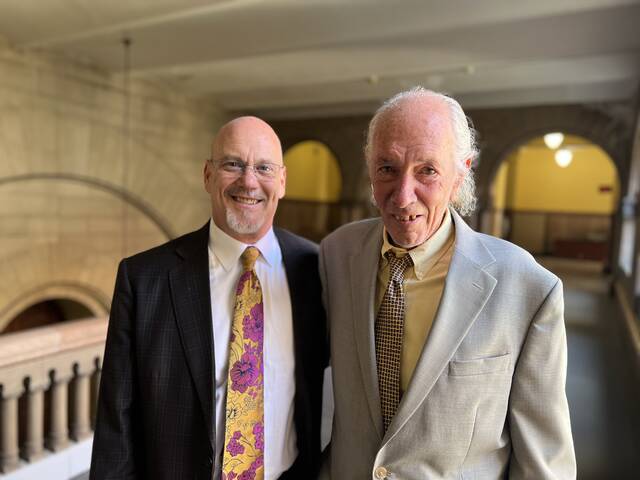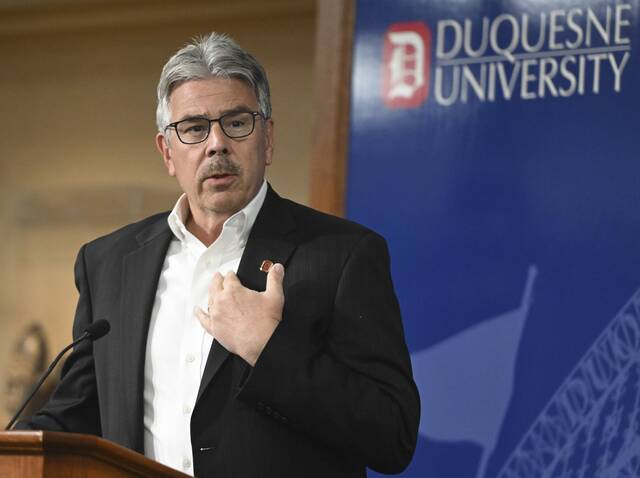A longtime defense attorney accused of sneaking drug-soaked papers into Allegheny County Jail more than four years ago is not guilty.
Paul Gettleman, 78, was charged with contraband, drug delivery and conspiracy, after a grand jury said he delivered papers soaked in K-2, or synthetic marijuana, to an inmate at the jail in April and May 2019.
Following a two-day nonjury trial before Allegheny County Common Pleas Judge Susan Evashavik DiLucente, Gettleman was cleared of all charges.
The judge made no comment following her verdict, which came immediately after the defense rested its case by calling no witnesses.
After the verdict, Gettleman’s defense attorneys, Lee Rothman and Paul Boas, were livid that the charges were filed in the first place.
“I have never, ever seen a more irresponsible prosecution on behalf of the DA’s office in Allegheny County,” Rothman said. “For a prosecutor to attack a lawyer, who, for over 45 years, fought for the constitutional rights of people in this community and beyond, is absurd. And I’m glad the court was able to see through the lies perpetrated before the grand jury and her.”
Through First Assistant District Attorney Rebecca Spangler, the DA’s office declined to comment Tuesday afternoon.
Longtime criminal defense attorney Paul Gettleman was found not guilty of all charges against him Tuesday following a nonjury trial. He was accused of sneaking drug-soaked paper into Allegheny County Jail in 2019. Here’s his reaction. pic.twitter.com/m9bTYKX2sE
— Paula Reed Ward (@PaulaReedWard) August 22, 2023
Gettleman’s legal troubles began on Dec. 15, 2019, when the grand jury recommended charges be filed against him stemming from two clients he represented at the jail.
The first set of charges were dismissed at a preliminary hearing in July 2021.
However, Gettleman still faced charges stemming from his representation of Terrell Lineburg, an inmate who admitted in his testimony to selling K-2-soaked paper, suboxone and tobacco in the jail.
The prosecution presented two key witnesses — Lineburg and his girlfriend, Ceara Morton. They also submitted as evidence a video taken from inside an attorney visitation room at the jail on May 23, 2019, in which Gettleman gives Lineburg a large envelope with a thick stack of papers in it.
The testimony from Lineburg and Morton, however, was marked by inconsistencies and lies, which they admitted to on the witness stand.
According to testimony at trial, Lineburg was in the jail on a gun case when, in 2018, he began a scheme where he had Morton buy blank K-2-soaked paper, and then print legal information on it.
During hundreds of recorded calls from the jail, Lineburg would tell Morton what to print, including docket sheets, the Constitution and case law.
Lineburg testified that there were a variety of ways he would then get the drug-soaked paper into the jail — disguised as legal mail — including through corrections officers, the mail, legal visits and other inmates.
He then sold the drug-infused paper, selling 1/4-inch squares, that the inmates could smoke.
During his grand jury testimony, Lineburg said he earned about $190,000 over two years selling the K-2 and other drugs inside the jail.
Morton was in charge of the financial side of the business, collecting cash from inmates’ girlfriends or through Cash App on her cell phone.
Morton claimed in her testimony on Tuesday that she didn’t know Lineburg was selling drug-laced paper, but that she was suspicious because she frequently met with a woman to buy blank sheets of paper for $3oo each.
Their scam continued throughout 2018 and early 2019 until Lineburg’s case was scheduled to go to trial.
He and Morton both said in their direct testimony that Morton met with Gettleman on April 29, 2019, and that she paid Gettleman $500 for him to take the drug-soaked paper into the jail and give it to Lineburg during a legal visit.
“He told me to put the papers in an envelope and bring the payment for Mr. Gettleman and meet him in front of the jail,” Morton testified.
But in cross-examination, and through recorded jail calls played by the defense, it became clear that Morton met with Gettleman to retain him to represent Lineburg the next day at trial.
The defense presented three receipts from Gettleman’s law firm, including one from that date for $2,500 that Morton had signed.
The receipt had a note on it that Gettleman would return $1,500 of the money if Lineburg’s case the next day wasn’t postponed.
In the recorded phone call, Lineburg talked about being dissatisfied with his attorney at the time and wanting Gettleman to take over the case.
Gettleman agreed to appear on his behalf, and the next day, April 30, 2019, Lineburg pleaded guilty on the advice of Gettleman and his previous attorney. Lineburg, who is still incarcerated, said he expected one sentence, but ended up with six to nine years incarceration because of a separate probation violation.
During his testimony, Lineburg admitted he was mad at Gettleman when he learned what his sentence was going to be.
“I felt like I was misrepresented,” Lineburg testified. “I was led to believe one thing, and I got another.”
It was after Lineburg was transferred to SCI Smithfield months later that a corrections officer found the K-2-soaked paper in his cell.
Lineburg claimed he got the paper from Gettleman, and testified to it at the grand jury — after he was given immunity from prosecution by the DA’s office.
“I didn’t want to incriminate myself,” Lineburg said.
Although Lineburg testified at trial that Gettleman gave him the drug-soaked papers at their first meeting, he told the grand jury that he did not receive papers from the attorney at that first visit.
“When you’re jammed up, you lie?” Rothman asked on cross-examination.
“Yes,” Lineburg answered.
“So, whenever you get in trouble, you lie?” the defense attorney continued.
“Not every time,” the witness responded. “There’s times when I get in trouble, I lie, yes.”
After the prosecution rested, the defense made a motion for the judge to throw out the case.
Boas argued that Assistant District Attorney Mike Siegert failed to present any evidence that Gettleman had any knowledge that any papers he took into the jail were laced with drugs.
“The commonwealth failed to produce a scintilla of evidence Paul Gettleman knew the papers he brought in had drugs on them,” Boas said. “This is a criminal case where the commonwealth has to prove intentional conduct.”
He also argued that the testimony from Lineburg and Morton changed every time they told their story.
“Both of them admitted they were constantly lying, mistaken, wrong,” Boas said.
Further, the defense said, the prosecution failed to prove that the papers taken from Lineburg’s cell in the state prison in September 2019 were even the same as the ones Gettleman provided.
The prosecution admitted in a stipulation that all of the papers Gettleman gave Lineburg during the May attorney visit appeared to be on white copy paper and were not remarkable in any way.
However, the corrections officer who found the drug-laced paper in the prison said it was gray and had a gritty texture.
In a twist that prompted outrage from the defense during pretrial motions, the evidence was destroyed by the state police 13 months after Lineburg pleaded guilty to having the contraband in prison — and after Gettleman’s attorneys asked that it be preserved.
“This case never should have been brought,” Boas told the judge. “It’s a disgrace. I’m asking the court to do what justice demands here.”
Siegert acknowledged in his argument that the court had to judge the credibility of the witnesses in the case.
But he also argued that the parties were smart enough not to talk blatantly on recorded lines about their drug dealing.
Lineburg told Gettleman he wanted his “other services,” Siegert said.
“That is evidence the defendant knew there were drugs on the paper,” the prosecutor said. “The fact he’d be so stupid to not know there were drugs on the paper is just unfathomable based on his experience.”
Siegert told the court that the prosecution only had to prove one delivery occurred, which he said he did, by showing the May 23, 2019, meeting at the jail — which occurred three weeks after Lineburg had pleaded guilty.
The attorney visit that day, he said, lasted 2 minutes and 27 seconds.
“What kind of legal work do you get done in 2 minutes and 27 seconds?” Siegert asked.
The judge denied the motion for judgment of acquittal, but immediately rendered her not guilty verdict.
After the verdict, a visibly elated Gettleman said the charges were a “rush to judgment” with him as the target.
He was particularly frustrated that the DA’s office never had the courtesy to ask him about the allegations even after he’s had a working relationship with them for so long.
“For the last 50 years, I’ve been fighting for people’s rights, and the right to be free, and then I got to see the other side of it, what it’s like to sit there and have people lie to you,” he said. “Freedom’s a constant struggle, and I’ll struggle with it ‘til the day I die.”








